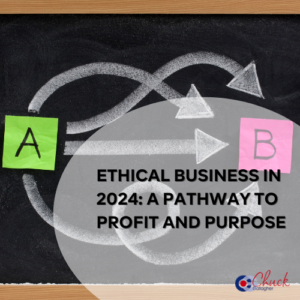 The line between right and wrong in business blurs with every passing scandal. Gone are the days when the sole pursuit of profit ruled the corporate world. Today, a new paradigm emerges, where ethical considerations are not just a moral obligation but a strategic necessity. This shift is not just a fleeting trend but a fundamental change in how businesses operate and thrive in a rapidly evolving marketplace.
The line between right and wrong in business blurs with every passing scandal. Gone are the days when the sole pursuit of profit ruled the corporate world. Today, a new paradigm emerges, where ethical considerations are not just a moral obligation but a strategic necessity. This shift is not just a fleeting trend but a fundamental change in how businesses operate and thrive in a rapidly evolving marketplace.
The landscape of ethical business is complex, marked by both pitfalls and opportunities. As we delve into this intricate world, we find that the journey towards ethical business practices is not just about avoiding the negative but embracing the positive. It’s a story of transformation, where companies are not just expected to do no harm but to actively do good.
The Ethical Imperative: More Than Just Avoiding Scandals
The journey towards ethical business practices is fraught with challenges as companies navigate the delicate balance between profit and principle. The aftermath of the 2008 financial collapse serves as a stark reminder that the adage ‘the business of business is business’ no longer holds water. Pursuing profit without ethical considerations can lead to dire consequences, as evidenced by the questionable practices of companies like Amazon. According to Ruth Strange from Ethical Consumer, Amazon’s corporation tax avoidance in 2021 alone may have cost the UK public purse up to £500 million.
Called the Triple Bottom Line: People, Planet, and Profit
The concept of the Triple Bottom Line, which prioritizes people, planet, and profit, is gaining traction among successful CEOs. Dr. Zareen Roohi Ahmed, founder of Gift Wellness and author of The Gift, highlights the importance of being rooted in purpose and fairness. This approach fosters consumer trust and loyalty and creates a strong, united corporate culture driven by shared values. Companies perceived as ethical by their employees enjoy higher engagement, retention, and productivity levels, turning ethical practices into a strategic advantage.
Leading by Example: Companies Embracing Ethical Practices
The shift towards ethical business is evident in the growing consumer spending on ethical products and investments in ESG-based investment products. Companies like PensionBee exemplify responsible decision-making, aligning responsibility with profitability. Romi Savova, CEO of PensionBee, emphasizes the importance of considering a broad range of stakeholders in business decisions. Bruce Cartwright, chief executive of ICAS, advocates for ethical leadership to be an integral part of the UK’s Corporate Governance Code, highlighting companies like Britvic that have adapted their market offerings to embrace sustainable products.
The Role of CEOs in Driving Ethical Practices
CEOs play a pivotal role in driving ethical practices within their organizations. Ildiko Almasi Simsic, a social development specialist and author, stresses the importance of CEOs in fostering inter-departmental collaboration and ensuring that policies are translated into clear, implementable actions. The procurement team, for instance, plays a crucial role in putting Human Rights Policies into practice through supplier due diligence and social impact provisions in contracts.
Conclusion: Ethical Business as a Strategic Advantage
As we look towards the future, the question remains: Can companies viewed as ethical by employees showcase enhanced business outcomes? The answer is a resounding yes. In today’s conscientious market, ethical considerations are not just a moral compass but a strategic advantage propelling businesses forward. Mission-driven employees are more likely to go the extra mile, translating into more efficiency and better business outcomes.
In conclusion, the path to ethical business in 2024 is not just a journey of compliance but an opportunity for transformation. It’s a chance for companies to redefine their purpose, align their actions with their values, and, in doing so, find a sustainable path to profit and purpose.


